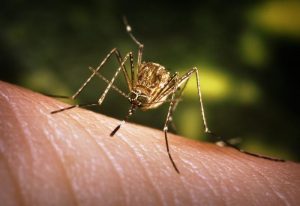By NewsDesk @bactiman63
Researchers at the University of California, Davis and Colorado State University presented evidence at the ASTMH Annual Meeting that adding ivermectin to backyard bird feeders has a potential to reduce local transmission of West Nile Virus (WNV) in the U.S.

WNV is transmitted to humans by mosquitoes. But birds serve as key amplifiers of the virus in nature, keeping it circulating in local mosquito populations and maintaining its threat as the most common mosquito-borne pathogen in the U.S.
“We found that widespread use of ivermectin in backyard birdfeeders could reduce neighborhood transmission of West Nile Virus by about 60%,” said lead author Dr. Karen Holcomb, a recent PhD graduate from the Chris Barker lab at UC Davis School of Veterinary Medicine. “That’s because a low dose of ivermectin is harmless for birds, but it gets in their blood and can be lethal for mosquitoes that feed on them.”
Holcomb said the approach could help prevent or control local outbreaks like the one that led to more than 800 confirmed and probable cases in Arizona earlier this year and killed 67 people. The disease often causes thousands of infections each year and even people who have few symptoms from WNV can experience long-term neurological problems. There are no drugs to cure an infection or vaccines for humans to prevent the disease, which emerged in the U.S. in 1999 and is now found in every state except Alaska and Hawaii.
Subscribe to Outbreak News TV on YouTube
Holcomb and her colleagues initially used backyard chickens to test whether mixing ivermectin into birdfeed could have a large enough impact on mosquito populations to affect WNV transmission. They found evidence of increased mortality in mosquito populations that fed on the treated chickens and a reduction in WNV infections in chickens that ate the ivermectin bird feed compared with those that did not. Based on the positive results from this work, they then moved to evaluate its potential impact with wild birds that are regular visitors to backyard birdfeeders.
Holcomb and Barker collaborated with Dr. Brian Foy, PhD, an expert in both WNV and ivermectin at Colorado State, to identify bird species that meet four key criteria: They make frequent trips to birdfeeders; they roost at night in areas near birdfeeders; they are bitten frequently by WNV vector mosquitoes; and they are present in large numbers in suburban neighborhoods across the U.S. By tagging birds and using cameras to monitor feeders as well as locating birds at night with radio telemetry, they determined that offering a wide range of common backyard bird feed blended with ivermectin could produce a sharp drop in local West Nile Virus infections if efficacy and spatial coverage are high enough.
Foy, who also is exploring ivermectin’s potential to reduce malaria transmission, said misguided interest in using ivermectin for COVID-19 could divert supplies needed for proven uses, like fighting river blindness, or for developing novel applications, like fighting malaria and WNV. He said he already has experienced difficulty finding enough ivermectin for his work—and what he is finding seems to be of lesser quality.
“I understand that at the beginning of the pandemic, when we had nothing, it was valid to at least consider a drug like ivermectin because there was some evidence of general anti-viral properties,” he said. “But we have vaccines and a growing number of proven treatments, yet the demand for ivermectin, which has no demonstrated benefit so far to treat COVID-19, seems to be growing.”
“This research demonstrates that ivermectin, when used correctly, can prevent millions of life-threating and debilitating parasitic infections,” said ASTMH President Julie Jacobson, MD, DTM&H. “We must follow the science and continue to shed light on its best use as a frontline defense against neglected tropical diseases.”
- C. diff awareness
- Chickenpox cluster reported in Summit County, Colorado
- South Africa reports increase in influenza
- Maryland reports travel-associated monkeypox case
- Measles outbreak in Kasongo territory in southern Maniema, DRC
- Cholera outbreak reported in Lacs district, Togo
- COVID-19: Immune cells stay high in number six months after vaccination
- COVID-19 booster: Lower antibody level doesn’t mean less protection from the coronavirus
- Multistate outbreak of E. coli O157 infections linked to baby spinach


One of the best uses for Ivermectin yet! I found this article very informative against the WNV that has no vaccine yet. An easy solution to control a nasty virus.